COVID-19 and Anti-Vaxxers
How will anti-vaxxers’ reluctance to take the COVID-19 vaccine harm America’s ability to recover from the pandemic?
The U.S. government is offering many incentives for Americans to take vaccines for COVID-19, such as free parking outside vaccination sites. (Joshua Hoehne / UnSplash.com)
After over a year of masks, social distancing, and working and learning from home, it feels like the COVID-19 pandemic is finally coming to an end in the United States. How long it takes for us to actually get back to normal, however, is entirely dependent on whether enough people get vaccinated.
As of June 11th, 2021, 43% of Americans are fully vaccinated, with another 9% having had just their first dose. While that is a considerable amount, it still leaves out more than half of the country.
So let us look at who that remaining 53% of the unvaccinated population includes. Roughly 20% of Americans are under 16, and since the vaccine has just recently been approved back in early May 2021 for 12-15 year olds, many children in that category will not yet have been vaccinated. If we count out all of them, that still leaves one third of the country unvaccinated, while at least 80% of Americans need to be vaccinated in order to achieve herd immunity.
Looking at the numbers by state, one sees that not every region has been vaccinated equally; for instance, southern states such as Mississippi, Alabama, Louisiana, and Tennessee have substantially lower vaccination rates than the national average. This is due to a number of factors — a more rural population, lower implementation of state systems to deliver vaccines, and, most notably, a partisan divide.
In April 2021, NPR found that one in four Americans would refuse a Coronavirus vaccine if the injection was offered to them, with another 20% being undecided. The refusal rate is highest among the rural population and Republican men. A Monmouth University poll from April 14th, 2021 found that 43% of Republicans are unwilling to get the vaccine, while 22% of Independents and only 5% of Democrats would refuse it.
These statistics demonstrate that the biggest challenge to reaching herd immunity in this country is a rampant increase in vaccine skepticism among Republicans. This skepticism has been exacerbated by the COVID-19 pandemic, but did not start with it. In 2019, months before the beginning of the Coronavirus pandemic, a Gallup poll found that 84% of Americans believed vaccinating children is extremely or very important, equal to the numbers from five years earlier, and down 10% from 2001.
The number of anti-vaxxers has certainly skyrocketed in the United States, especially among those who lean far to the right politically. Considering this, it is definitely worth examining the long-term impact that the era of Trump and fake news may have had on trust in science and modern medicine.
In the United States, the COVID-19 pandemic is not over. Thousands of Americans continue to test positive for COVID-19 each day and hundreds are still dying from it every day in the United States. To put the Coronavirus pandemic in the past and move forward as a country, everyone will have to receive scientifically-supported news and, most importantly, a vaccine.
To put the Coronavirus pandemic in the past and move forward as a country, everyone will have to receive scientifically-supported news and, most importantly, a vaccine.
Rahm Rodkey is an Editor-in-Chief for 'The Science Survey.' He enjoys how journalistic writing is able to connect people on a global scale, and that it...

